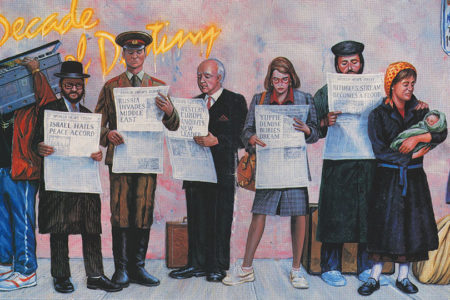Decorum in the Local Church 1 Corinthians 11–14
The Lord’s Day is that one day each week when the body of Christ meets for edification, fellowship, preaching, and blessing. The cares of life are set aside for several hours, and our attention is focused upon the Word of God, the person of Christ, and sweet communion with fellow believers. Many of us look forward with great anticipation to those times. While the world says, “Thank God it’s Friday,” many of God’s people respond, “Thank God it’s Sunday.” Although it may be a busy day, it is more often a blessed day.
In his first letter to the Corinthian church, Paul dealt with situations within that fellowship relating to their worship services. Over a period of several years since Paul had begun this ministry, it had developed many problems. In earlier portions of this epistle he had discussed the matters of division, lack of discipline, domestic life, and the duty of believers to the Lord and to one another. (It is apparent that all of the difficulties the Corinthians encountered came from the same root: lack of consideration for others because of a desire to satisfy self rather than the Lord.)
Paul then addressed another problem, one that involved several areas—the decorum or behavior of believers as they met for worship. The situation had apparently gotten out of hand, and Paul devoted a major portion of this letter (four chapters) to dealing with these worship matters.
In chapters 8 to 10 Paul had established broad, sweeping principles indicating that a believer should so live for the Lord that he would neither cause a weaker brother to stumble and fall nor prevent an unsaved person from coming to the Lord.
A self-indulgent spirit had swept the church at Corinth causing them to become so wrapped up in themselves that they no longer considered the needs of others. In addition, self-gratification had apparently caused some members to misuse the spiritual gifts which had been sovereignly bestowed upon them by the Spirit of God for the benefit of the entire assembly, and these attitudes prevailed in the behavior at their services. While some of the problems addressed in these chapters may be different from those faced by churches today, Paul’s principles are, nonetheless, extremely practical and should be followed by every church and every believer.
The Wrong Kind of Headship
We all like our freedom. We do not want others to tell us what to do and how to do it. However, the Corinthians were apparently exercising freedoms without regard to others. To alleviate this problem, Paul first dealt with the matter of headship. In context, he began with the ordinance of the Lord’s supper stating, “But I would have you know that the head of every man is Christ; and the head of the woman is the man; and the head of Christ is God” (1 Cor. 11:3).
While some people feel that this type of teaching promotes male chauvinism and that Paul’s remarks are humiliating to women, such is not the case. In this verse, Paul first established that the head of man is Christ and that man is to be in subjection to Him just as Jesus was to His Father. In the classic passage on marriage in Ephesians 5, Paul stated that although the woman is to submit herself to her husband as unto the Lord (v. 22), the husband is to love his wife as Christ loved the Church (v. 25). The proper submission of the wife to her husband and the husband to Christ affords honor and protection to the wife.
God’s inspired penman spoke of bringing his own body in subjection to the Lord, lest he become a castaway. His point was very simple: The Corinthians had a duty to submit themselves to the Lord; they were not to have a self-indulgent spirit and live according to their own will rather than the Lord’s will. They belonged to Christ and were no longer their own. This is a principle which we should remember today.
The Wrong Kind of Apparel
When this author was in his youth, every woman wore a hat to church. It was the accepted thing to do. In fact, people often had to stretch their necks to try and see the pastor through the latest millinery fashion show. It was especially difficult on Easter, when each lady wore the latest design. This, of course, is not what Paul meant when he said that women should cover their heads.
To this day, a veil is still worn by many women in the Middle East. In Paul’s day, the veil was even more concealing. A woman of respectability was never seen in public without it. American missionaries in certain Middle Eastern cultures find it best to wear a veil in public even today. Not wearing a head covering was a sign that a woman was a prostitute. Also, a woman whose head was shorn was either a prostitute or in deep mourning. If a woman did not cover her head while participating in a service (11:5), she dishonored her head and, thereby, her husband. Conversely, if a man covered his head during a service, he dishonored his head since “he is the image and glory of God” (11:4, 7).
When Paul established this principle, he went against all he had ever been taught by the rabbis and Jewish custom (still observed today) which taught that a man’s head should be covered by the tallith or yarmulke. It comes from a misunderstanding of Moses’ face being veiled when he descended from Mount Sinai. Moses did not cover his face because of the glory of God but because the glory was fading (2 Cor. 3:13).
Paul understood the glory of his inheritance in Christ and was, therefore, willing to contradict all that he had learned. He recognized Jesus Christ as his Head and Master, the one who exercised all authority over him. In Christ, the veil is done away, even though this has not yet happened to the unbelieving Jewish nation.
Quiet controversy still exists today over whether a woman should wear a head covering in church. Some groups insist on the woman’s head being covered, while others feel that Paul was addressing a custom from the Middle East in ages past. Commentators are either divided on the subject or are strangely silent. Whatever position you hold, it should be understood that head covering was never intended to draw attention to the wearer.
The Wrong Kind of Feasting
In the ancient world there was much more social activity than we experience today. For instance, people regularly met together for meals. One such feast was called an eranos, to which each person or family brought a share of the food, much as we do at our potluck dinners. By the time Paul wrote 1 Corinthians, the church had developed a similar meal called the agape or love feast. This was often held in conjunction with the celebration of the Lord’s supper.
But again, things went wrong at Corinth. As in many churches today, there were rich and poor in the congregation; some could bring plenty of food, while others had only meager fare. For the poor, this may have been the only good meal of the week. The agape should have been a delightful time of fellowship, but somehow the fruit of the spirit of love had been lost. Instead of mutual distribution of the food, exclusive cliques developed who would not share their food with others but hurriedly ate it by themselves, while the poor had very little and went away hungry (11:21). Sadly, some who gathered for the love feast and the Lord’s supper even became drunk (11:21b). Paul vehemently rebuked these practices, stating that they did not show respect to the church of God or to the Lord’s supper. He condemned the church for allowing this to occur.
To correct the problem, Paul gave the clearest explanation of the Lord’s supper in the New Testament. He clearly enunciated the purpose for this ordinance, which was to remember what Christ had done on Calvary (11:26). He also reminded them of their responsibility to come to the Lord’s table with a proper heart attitude toward God. Not to do so could create many problems in their lives and could even cause early death (11:27–32).
To conclude this section, Paul returned to the subject of the love feast and warned the Corinthians, “if any man hunger, let him eat at home, that ye come not together unto judgment” (11:34). There was far greater significance attached to the Lord’s supper than the Corinthians had realized. It was not ordained to cause problems but to draw their attention to the work of Christ on the cross. Their self-indulgence and self-interest caused most of the problems. They had taken their eyes off of the central purpose of their gathering together.
The Wrong Use of Spiritual Gifts
Many people in the church at Corinth were misusing their divinely bestowed spiritual gifts for self-glorification. Apparently they wanted to be the center of attention.
To correct this situation, Paul reminded them that spiritual gifts were given by the Holy Spirit to all believers: “But all these worketh that one and the very same Spirit, dividing to every man severally as he will” (12:11). He then instructed the church that all believers have been baptized into one body by the Spirit of God (12:13). Using the analogy of various parts of the human body, Paul showed that just as all parts of the body are necessary to make up the whole, so each person within the church has his or her own spiritual gift, and each one has been put there to make a whole and complete body.
His logic is very simple. No spiritual gift is to function alone in the local assembly. God did not make all apostles, nor did He give the sign gifts to all (12:28–30). No one is a separate entity unto himself. The local church is a body made up of many parts which, together, form a whole. Should one member be given a special gift, he is not to flaunt it, try to pressure another person into developing that gift, or feel superior to one who does not have that specific gift.
Chapter 13 is a masterpiece, especially when set in the context of this splendid letter to a church beset with so many problems. Paul explained that to experience God’s blessing, believers must love one another. They were to put aside their self-indulgent living and the self-gratifying practice of thrusting their spiritual gifts on the congregation. Spiritual gifts are bestowed on believers by the Holy Spirit at the time of salvation. Believers are to use them lovingly, conduct themselves properly when fellowshiping with other believers, and exhibit by their lives and behavior the love of Christ.
Finally, in chapter 14 the beloved apostle gave guidelines for the use of spiritual gifts so that a church can function in a manner beneficial to the entire membership. In essence, he minimized the sign gifts, which he had already said would soon cease (13:8–10). Meetings were to be held in such a way that everyone could understand what was being said and done: “Even so ye, forasmuch as ye are zealous of spiritual gifts, seek that ye may excel to the edifying of the church” (14:12; cp. v. 26b). Gifts were not to cause confusion in the meetings (14:33). “All things [in the church were to] be done decently and in order” (14:40).
Conclusion
And so, Paul wrote a very serious letter to a confused people at a church located in a very wicked city. Above all else, he wanted their lifestyle and the practices in the church to portray Christ. The decorum in their assembly had become repugnant. The members did not realize that Christ was their Head and that they were to be in submission to Him. Their love feasts had degenerated into groups of selfish people who did not care about others in the congregation, especially the poor. The Lord’s supper had become nothing more than a worldly practice because they had forgotten its true significance. And proud people were flaunting their spiritual gifts before the congregation, forgetting the importance of the rest of the body. Love and order were lacking.
Sad to say, it is easy to find many of these conditions in churches today. Before criticizing others, it would be wise for us, as Christians, to examine our own lives to see if we measure up to the truths Paul shared with the Corinthians. We are not to cast stones but, rather, examine ourselves to see that we are what the Lord would have us to be. Do we measure up to the standards Paul set? Do we live self-indulgent lives or seek self-gratification? Or are we in total subjection to Christ?









Great inputs. It can be hermeneutically applied in our church